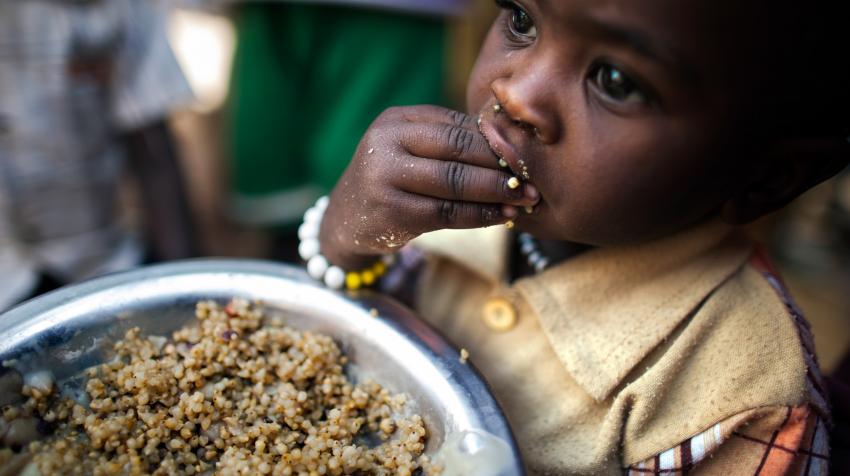African Hunger Across the vast expanse of the African continent, millions of people are facing an unrelenting enemy: hunger. The African hunger crisis, a complex and multifaceted issue, threatens the lives and livelihoods of millions, exacerbating poverty, displacement, and instability. In this article, we shed light on the root causes, devastating consequences, and urgent need for concerted global action to address the scourge of hunger in Africa.

The African Hunger Crisis: A Call for Global Action
Contents
The Scope of the Crisis:
The African hunger crisis is not a recent phenomenon but a longstanding challenge that has plagued the continent for decades. While progress has been made in some regions, many countries continue to grapple with food insecurity, malnutrition, and famine. According to the World Food Programme (WFP), over 250 million people in Africa are undernourished, with children and rural communities bearing the brunt of the crisis linetogel.
Root Causes:
Several interconnected factors contribute to the persistence of hunger in Africa. These include:
- Conflict and Instability: Protracted conflicts and civil wars in countries such as South Sudan, Somalia, and the Democratic Republic of Congo disrupt food production, distribution, and access, exacerbating food shortages and malnutrition.
- Climate Change: Africa is particularly vulnerable to the impacts of climate change, including droughts, floods, and desertification, which disrupt agricultural systems, diminish crop yields, and exacerbate food insecurity.
- Poverty and Inequality: Widespread poverty, inadequate infrastructure, and unequal access to resources perpetuate food insecurity and malnutrition, particularly among marginalized communities and rural populations.
Consequences:
The consequences of the African hunger crisis are dire and far-reaching, affecting individuals, families, and entire communities. These include:
- Malnutrition: Chronic hunger and inadequate access to nutritious food contribute to malnutrition, stunting the physical and cognitive development of children and increasing their susceptibility to disease and mortality.
- Health Impacts: Hunger weakens immune systems, making individuals more vulnerable to infectious diseases such as HIV/AIDS, tuberculosis, and malaria. Malnutrition also exacerbates maternal and child mortality rates.
- Economic Disparities: Food insecurity perpetuates cycles of poverty and inequality, hindering economic development and social progress in affected regions. Lost productivity and increased healthcare costs further strain already fragile economies.
Call for Action:
Addressing the African hunger crisis requires a comprehensive and coordinated response from governments, international organizations, civil society, and the private sector. Key actions include:
- Investing in Agriculture: Supporting smallholder farmers, improving agricultural infrastructure, and promoting sustainable farming practices can enhance food security and resilience to climate change.
- Conflict Resolution: Prioritizing peacebuilding efforts, conflict resolution, and humanitarian assistance in conflict-affected regions can mitigate the impact of violence on food security and facilitate access to essential resources.
- Social Safety Nets: Implementing social protection programs, such as cash transfers and food assistance, can provide vulnerable populations with a safety net during times of crisis and help prevent hunger-related emergencies.
- Climate Adaptation: Investing in climate-smart agriculture, water management, and disaster preparedness measures can help African countries adapt to the impacts of climate change and build resilience to future shocks.
- Global Solidarity: Mobilizing international support, financial resources, and technical expertise is essential to address the root causes of hunger in Africa and achieve the Sustainable Development Goal of zero hunger by 2030.
Conclusion:
The African hunger crisis is a humanitarian tragedy that demands urgent attention and collective action. By addressing the root causes of hunger, investing in sustainable solutions, and fostering global solidarity, we can help alleviate the suffering of millions and build a more resilient and food-secure future for Africa. Now is the time to act, to stand in solidarity with those facing hunger, and to reaffirm our commitment to leaving no one behind in the pursuit of a world free from hunger and malnutrition.

The Impact of African Hunger: A Humanitarian Crisis of Unprecedented Proportions
The African hunger crisis is not merely a statistic or a headline—it is a humanitarian catastrophe with far-reaching consequences for millions of people across the continent. Beyond the immediate suffering of those directly affected, the ripple effects of food insecurity reverberate throughout communities, exacerbating poverty, instability, and despair. In this article, we explore the multifaceted impact of African hunger and the urgent need for concerted action to address this pressing humanitarian crisis.
Human Suffering and Health Impacts:
At the heart of the African hunger crisis lies profound human suffering, as millions of individuals and families struggle to secure their next meal. Malnutrition, hunger-related illnesses, and food insecurity take a devastating toll on physical and mental health, particularly among children and vulnerable populations. Chronic hunger weakens immune systems, increasing susceptibility to infectious diseases and contributing to high rates of morbidity and mortality.
Stunted Development and Educational Barriers:
Malnutrition and hunger in early childhood can have long-term consequences for physical and cognitive development, perpetuating cycles of poverty and inequality. Children who experience chronic hunger are more likely to suffer from stunted growth, cognitive impairments, and learning disabilities, hindering their ability to thrive academically and economically. Lack of access to nutritious food and essential nutrients also undermines educational attainment and perpetuates intergenerational cycles of poverty.
Economic Strain and Lost Opportunities:
The African hunger crisis imposes a heavy economic burden on individuals, families, and communities, undermining livelihoods and exacerbating poverty. Food insecurity diminishes productivity, as individuals struggle to perform daily tasks on an empty stomach. Families are forced to divert scarce resources away from essentials such as healthcare and education to meet basic food needs, further entrenching poverty and limiting opportunities for socioeconomic advancement.
Food insecurity and hunger exacerbate social tensions and fuel internal displacement and migration, as individuals and families seek refuge from famine, conflict, and environmental degradation. Displacement strains host communities and infrastructure, exacerbating competition for resources and heightening social tensions. In extreme cases, food insecurity can contribute to mass displacement and refugee crises, placing additional strain on already fragile humanitarian systems.
Political Instability and Conflict:
The African hunger crisis is often intertwined with political instability, governance failures, and protracted conflicts that exacerbate food insecurity and hinder humanitarian response efforts. In conflict-affected regions, armed groups may use control over food aid as a weapon of war, exacerbating humanitarian crises and perpetuating cycles of violence and instability. Weak governance and corruption undermine efforts to address food insecurity and ensure equitable access to resources, exacerbating social inequalities and eroding trust in institutions.
Conclusion:
The African hunger crisis is not just a humanitarian issue—it is a moral imperative and a collective responsibility that demands urgent action. By addressing the root causes of food insecurity, including conflict, climate change, poverty, and governance failures, we can work towards building more resilient and food-secure communities in Africa. Concerted efforts from governments, civil society, the private sector, and the international community are essential to alleviate the suffering of millions and ensure that all people have access to nutritious food and the opportunity to lead healthy, dignified lives. Only through sustained commitment and solidarity can we hope to end the scourge of African hunger and build a more equitable and sustainable future for generations to come.
Read More Article About “CHEESECAKE DIVINE DELIGHT: ELEVATE YOUR DESSERT EXPERIENCE“






